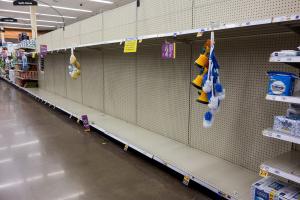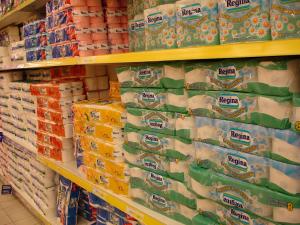 We are definitely in it now, a real, honest-to-goodness pandemic, birthed by the wide spread of the Coronavirus. Yesterday in my state, California, the governor first urged restaurants and bars to search for ways to keep patrons somehow distant from one another, but quickly decided it was far better to close such establishments completely for at least two weeks until the end of March. It is nearly certain that that period will be extended. The mayor of my city, Los Angeles, followed suit by closing bars, restaurants to all in-room dining, movie theaters (a definite tragedy in this town!), and gyms (a near equal tragedy for many of the youthful culture in the city). In addition, he urged that all persons 65 and older should strive whenever possible to stay in their homes. That includes my wife and me, since we had 65 in our rear-view mirrors long ago.
We are definitely in it now, a real, honest-to-goodness pandemic, birthed by the wide spread of the Coronavirus. Yesterday in my state, California, the governor first urged restaurants and bars to search for ways to keep patrons somehow distant from one another, but quickly decided it was far better to close such establishments completely for at least two weeks until the end of March. It is nearly certain that that period will be extended. The mayor of my city, Los Angeles, followed suit by closing bars, restaurants to all in-room dining, movie theaters (a definite tragedy in this town!), and gyms (a near equal tragedy for many of the youthful culture in the city). In addition, he urged that all persons 65 and older should strive whenever possible to stay in their homes. That includes my wife and me, since we had 65 in our rear-view mirrors long ago.
I thought I would get ahead of the grocery game a bit on Sunday morning. Since my local church was shuttered, ready to offer virtual church on-line later, I ventured out to my local store at about 5:30AM, imagining I would at that darkened hour be nearly alone in my quest for a few items. I drive up to the store and found two long lines of some 50 shoppers each, pushing carts, awaiting the opening of the doors of the place. It was raining, and, for LA, was rather cold. I just drove back home, waiting for another day to fight that war. It remains mysterious to me exactly why toilet paper of all things has become nearly extinct on store shelves. Approaching hurricanes and earthquake disasters yield runs (pardon the expression) on toilet paper, but why the virus should do so I cannot fathom. It is said that a roll of the stuff usually suffices for a day or two for a healthy couple, hence a pack of six roles should be good for about two weeks, if one is careful in its use and not unduly profligate. It seems, in this strange case, that toilet paper is the canary in the mine, the sign that panic has set in, that many of us feel that unmitigated disaster is upon us. I suppose if I eventually run out of it, I will need to resort to some other material to do my daily business, but it is still hard for me to understand this sudden fixation on the humble product.
In a notable irony, a huge toilet paper factory exists not 20 miles from where I live, a plant that has been churning out toilet tissue faithfully for many years, consistently restocking shelves of local stores—groceries, drug stores, etc.—each and every day. But for some reason known only to God, I suppose, the fear of its absence has driven many folk mad. This sudden insanity led to a delightful story in today’s newspaper. A man, a physical therapist and avid surfer (such a Los Angeles cliché!) took it upon himself to do something about this toilet paper problem. He lettered a cardboard sign, including the words toilet paper, stood at a busy intersection in the city, and asked people for any extra rolls of the stuff. Many cars honked and filled his request. Then, he proceeded to hand these gifted rolls to other people in cars who said they needed some, having failed in their own store visits to find any. For hours, this young man did a flourishing business in toilet roll exchange. No money changed hands; he was not acting out of entrepreneurial enterprise, but out of a desire to get some toilet paper out of the hands of a few hoarders and into the hands of a few needy ones. It was an act of kindly, neighborly socialism, from each according to their ability to each according to their need, if I may borrow loosely from Karl Marx. The story was accompanied by a picture of the man holding up a roll of paper, just handed to him by a passing driver, and looking for another driver to which he could hand the offered roll. He was asked by someone how much he was charging for his work, and the answer remained the same: nothing. He was just trying to spread out the wealth, at least as wealth was defined in rolls, not of dollar bills, but humble toilet tissue.
Of course, for us religious types there is a parable here (you just knew it was coming!). This surfer dude (his dialogue in the newspaper sounded rather like a Beach Boys song come to life) was doing an act of supererogation, as the ethicists like to say, a deed of absolute kindness, above and beyond what he really had to do. He was going the extra mile, handing off his coat, feeding the hungry, aiding the ones fallen in a ditch. It was a simple deed, hardly the stuff of legend, but the stuff of humanity, the urge to act on behalf of those he did not know but surely those he felt some sort of human affinity for.
I have no idea if that guy has any religious life, or whether or not he grew up in church, or spent his Sundays riding the waves. But the next time I read Matthew 25, Jesus’s magical story of the daily judgment (decidedly not “the final judgment” as it is too often misread), I will think of this man and his rolls of toilet paper. “’Lord, when did we ever see you naked, hungry, in prison?’ And he will answer, ‘Whenever you acted on behalf of these little ones, you acted for me.’” It is rather easy for me to see Jesus, standing on that traffic island, receiving and giving toilet paper rolls to passing drivers. Even in the midst of disruptive and scary pandemics, glimpses of the reign of God present themselves if only our clogged ears and cloudy eyes can permit us to hear and see.
(Images from Wikimedia Commons)















